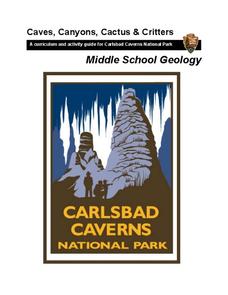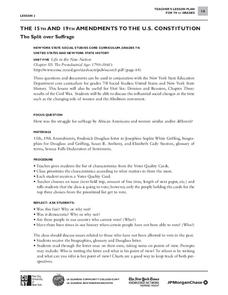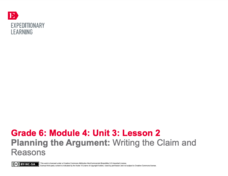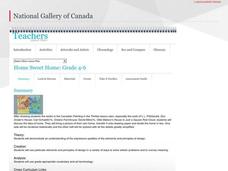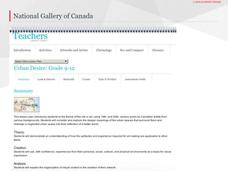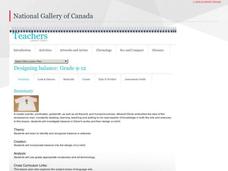EngageNY
Percent Rate of Change
If mathematicians know the secret to compound interest, why aren't more of them rich? Young mathematicians explore compound interest with exponential functions in the twenty-seventh installment of a 35-part module. They calculate future...
EngageNY
Fair Games
What constitutes a fair game? Scholars learn about fair games and analyze some to see if they are fair. They extend this idea to warranties and other contexts.
Henry Ford Museum
You Can Be an Innovator ... Like Henry Ford
Why did Henry Ford want to invent a car for the masses? Why did Henry Ford locate his factory in Detroit? Why did Henry Ford encourage the idea of a 5-day work week? Young innovators find the answers to these and other question in a unit...
Education Development Center
Choosing Samples
What makes a good sample? Your classes collaborate to answer this question through a task involving areas of rectangles. Given a set of 100 rectangles, they sample a set of five rectangles to estimate the average area of the figures. The...
Teach Engineering
Better By Design
Which modification is the best? Using the scientific method, pairs determine the effects of each control surface on the distance of a glider's flight. The activity, section 16 in a 22-part unit on aviation, allows pupils to gain a better...
Teach Engineering
Balsa Glider Competition
Change one variable and try again. Teams build basic balsa gliders and collect data on their flight distances and times. Through collaboration, the team decides on two modifications to make to the basic design and collect data for the...
Teach Engineering
Equal and Opposite Thrust in Aircraft: You're a Pushover!
It's the law—every action requires a reaction, no matter how small. Pupils experience two demonstrations of Newton's third law of motion as it relates to thrust in the 10th segment of a 22-part unit on flight. Using their mathematical...
Virginia Department of Education
World History and Geography: 1500 A.D. (C.E.) to the Present
Intended to help Virginia teachers align their curriculum to the state's history and social science standards, this packet provides a wealth of materials for any social studies or science instructor. Loaded with plans, suggestions for...
EngageNY
How Do Dilations Map Angles?
The key to understanding is making connections. Scholars explore angle dilations using properties of parallel lines. At completion, pupils prove that angles of a dilation preserve their original measure.
EngageNY
The Power of Algebra—Finding Pythagorean Triples
The Pythagorean Theorem makes an appearance yet again in this lesson on polynomial identities. Learners prove a method for finding Pythagorean triples by applying the difference of squares identity.
EngageNY
Linear Systems in Three Variables
Put all that algebra learning to use! Using algebraic strategies, learners solve three-variable systems. They then use the three-variable systems to write a quadratic equation given three points on the parabola.
National Park Service
Caves, Canyons, Cactus, and Critters
Mother Nature's Gravel Company is open for business! The unit includes four lessons covering weathering and erosion. Experiments are simple to complete and young geologists compare notes to see who makes the biggest ice wedge, moves...
City University of New York
The 15th and 19th Amendments to the U.S. Constitution
Who gets to vote? Learn more about struggles for suffrage throughout United States history with a lesson based on primary source documents. Middle schoolers debate the importance of women's suffrage and African American suffrage before...
EngageNY
Planning the Argument: Writing the Claim and Reasons
Step up! Using the resource, scholars discover the six steps to writing an effective position paper. Next, they work on a graphic organizer to begin planning their argument-based essays.
Curated OER
Random Acts of Kindness For Kids
Develop a world-wide, email chain on which class members can showcase their acts of kindness. After defining the meaning of random acts of kindness through discussion and through a reading of Random Acts of Kindness,...
iCivics
Students, Engage!
Discuss as a class some problems that you would like to see changed in your school or community, and then take action! After your young citizens determine the appropriate steps they should take to accomplish their objectives, they will...
Teach Engineering
How Antibiotics Work
Take two pills and call me in the morning. The first lesson in a short unit of four introduces class members to delivery methods of medicines. The instruction introduces the question of which delivery method is best to get you feeling...
James Madison Memorial Fellowship Foundation
Those "Other Rights:" The Constitution and Slavery
Did the United States Constitution uphold the institution of slavery, or did it help to destroy it? Young historians study Article 4, Section 2, Clause 3 of the Constitution and evaluate the rights of slaveowners as they compared to or...
Curated OER
Shaking the Movers: Youth Rights and Media
Children have rights! Exploring those rights and using media to express those rights is the focus of this Media Awareness Network lesson. Although some of the law links reflect the Canadian Articles of The Convention, the majority of the...
National Gallery of Canada
Reading Symbols
Introduce your upper-elementary students to printmaking. Class members view prints, select and research symbols in a piece, and create their own sets of prints using styrofoam trays. Pupils can wash off the paint on their trays to make...
National Gallery of Canada
Home Sweet Home
What are your pupils' homes like? Incorporate their homes into a drawing lesson. Using an enlarged photograph, class members draw a grid so they can easily split their drawing in half. The final product should demonstrate cool colors,...
National Gallery of Canada
Urban Desire
Urban spaces are often overlooked and broken down. Offer your pupils the opportunity to reimagine an urban space. Learners examine and discuss works of art related to this theme and consider their own communities. Small groups then...
National Gallery of Canada
Designing Balance
Teach your artists how to incorporate balance into their work through discussion and action. After viewing and discussing several works of art, learners design a balanced image for a T-shirt and follow the step-by-step instructions to...
John F. Kennedy Presidential Library & Museum
Ask Not What Your Country Can Do for You
Ask not what the lesson here can do for you, but what you can do with the lesson. The answer is quite a lot! Young scholars revisit JFK's famous inaugural address with a focus on his plea for civic engagement. There's a letter to JFK...













